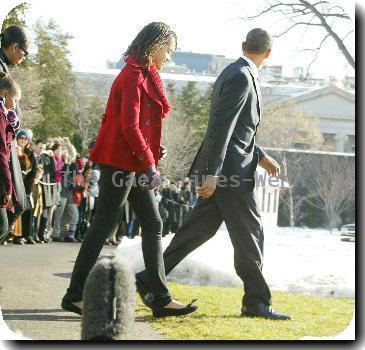Direct Mideast peace talks resume after 2 years; US vows support but says cannot impose a fix
By Matti Friedman, APThursday, September 2, 2010
New round of direct Mideast peace talks begins
WASHINGTON — Israeli and Palestinian leaders sat down for their first direct peace talks in two years on Thursday, pledging to overcome deep skepticism and disappointment with past U.S.-brokered attempts to resolve the long-running conflict.
Formally opening the negotiations after a day of discussions with President Barack Obama at the White House, Secretary of State Hillary Rodham Clinton implored Israeli Prime Minister Benjamin Netanyahu and Palestinian President Mahmoud Abbas to make the difficult compromises needed to forge an agreement.
“I know the decision to sit at this table was not easy,” said Clinton, who with U.S. special Mideast envoy George Mitchell has been working to relaunch talks stalled for 20 months. “We understand the suspicion and skepticism that so many feel borne out of years of conflict and frustrated hopes.”
“But, by being here today, you each have taken an important step toward freeing your peoples from the shackles of a history we cannot change and moving toward a future of peace and dignity that only you can create,” she said.
Flanked by Abbas and Netanyahu at the head of a U-shaped table in the State Department’s ornate Benjamin Franklin room, Clinton said the Obama administration was committed to forging a settlement in a year’s time. She stressed, though, that the heavy lifting must be done by Netanyahu and Abbas with support from the international community, particularly the Arab and Israeli publics.
“We will be an active and sustained partner,” she said. “But we cannot and we will not impose a solution. Only you can make the decisions necessary to reach an agreement and secure a peaceful future for the Israeli and Palestinian people.”
Netanyahu and Abbas vowed to work through the region’s deeply ingrained mutual hostility and suspicion.
“I see in you a partner for peace,” Netanyahu told Abbas. “Together we can lead our people to a historic future that can put an end to claims and to conflict. Now this will not be easy. A true peace, a lasting peace would be achieved only with mutual and painful concessions from both sides.”
Abbas called on Israel to end Jewish settlements in the West Bank and other areas that the Palestinians want to be part off their own state. Netanyahu insisted that any agreement must assure Israel’s security as a Jewish state.
“We do know how hard are the hurdles and obstacles we face during these negotiations — negotiations that within a year should result in an agreement that will bring peace,” Abbas said.
Thursday’s negotiations are the first since the last effort broke down in December 2008. A spate of violence this week in the West Bank and concerns about Israeli settlement activity have cast low expectations.
U.S. officials have said success may only be measured by an agreement to hold a second round of negotiations. Officials say they are hoping to arrange that meeting for Sept. 15 in the Egyptian Red Sea resort of Sharm el-Sheik.
Underscoring the talks’ fragility, gunmen from the militant Palestinian Hamas movement killed four Israeli residents of a West Bank settlement on Tuesday. And, on Wednesday, hours before the leaders ate dinner at the White House, Hamas gunmen wounded two Israelis as they drove in their car in another part of the West Bank.
Hamas rejected the talks and stepped up its rhetoric as the ceremony in Washington began.
“These talks are not legitimate because the Palestinian people did not give any mandate to Mahmoud Abbas and his team to negotiate on behalf of our people,” said Sami Abu Zuhri, a Hamas spokesman. “Therefore, any result and outcome of these talks does not commit us and does not commit our people, it only commits Abbas himself.”
Further complicating the situation is the fact that the talks will face their first test within weeks, at the end of September, when the Israeli government’s declared slowdown in settlement construction is slated to end.
Palestinians have said that a renewal of settlement construction will torpedo the talks. The Israeli government is divided over the future of the slowdown, and a decision to extend it could split Netanyahu’s hawkish coalition. Netanyahu has given no indication so far that it will continue beyond the deadline.
Direct Israeli-Palestinian negotiations broke off nearly two years ago, in December 2008, and the Obama administration spent its first 20 months in office coaxing the two sides back to the bargaining table.
After listening to the Mideast leaders he convened Wednesday night, Obama pronounced himself carefully optimistic. “I am hopeful, cautiously hopeful, but hopeful,” he said.
Tags: Barack Obama, International Agreements, Israel, Middle East, North America, Palestinian Territories, T.i., United States, Washington, West Bank

